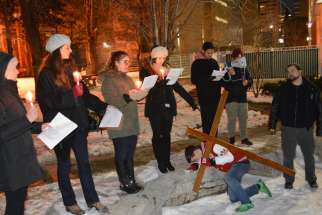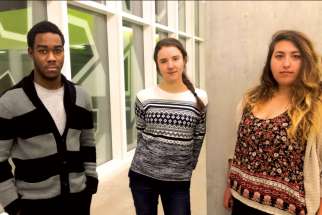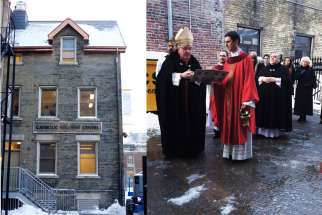TORONTO - Toronto’s downtown Catholic campus chaplaincies came together to be visible witnesses of their faith on the streets.
Ryerson pro-lifers lose appeal for club status
TORONTO - The Ryerson Students’ Union (RSU) board of directors unanimously voted to reject a campus pro-life club’s application to become an official student campus group.
Ryerson Catholics celebrate blessing of new student centre
What used to be a house in the heart of downtown Toronto is now a new home for Catholic students seeking a place to study and relax.
Commuter-school chaplaincies ‘gather the scattered’
Toronto - With Toronto’s universities heavily populated by students who live off-campus, on-campus Catholic chaplaincies work hard to keep commuters coming back.
“Everyone has a different experience with chaplaincy,” said Joseph Zambon, a pastoral assistant at York. “Some members just come for Sunday Mass while other members just go to one-time events held by the chaplaincy throughout the school year.”
At the University of Toronto, the approach of the Newman Centre chaplaincy is to break it down into smaller, more focused groups. This builds a stronger sense of community with its members. There is also one major retreat for students each term as well as regular services such as Mass seven times a week and adoration after every Friday Mass. The Newman Centre also hosts “A Date to Remember,” a popular speed-dating night for single Catholic young adults.
York University’s chaplaincy team, which is located on the Keele campus about an hour north of downtown Toronto by public transit, deals almost exclusively with commuters. Because of this, the chaplaincy has very little activity over the weekends, except for Sunday Mass.
The bulk of its services run from 10 a.m. to 4 p.m. on weekdays, when the campus is alive with students and when they can come and go depending on their class schedules. When the campus virtually shuts down on the weekend, so too does the chaplaincy team for the most part.
Despite the lack of weekend activity, the York chaplaincy enjoyed a successful welcome week on campus. It celebrated a “Blitz Week” handing out popcorn, doing surveys and questionnaires to raise awareness about the chaplaincy. The most recent event, Grill the Priest, was held on Sep. 18 and Sept. 20 in the early afternoon. Students had a chance to ask a priest any tough questions about the Catholic faith.
The Ryerson University chaplaincy, located at the heart of downtown Toronto, estimates that 50 per cent of its student members commute more than 45 minutes to get to school.
“It has been my experience that commuter students are eager and excited to get involved. They have a desire to join a student group precisely because they are a commuter student and they want to feel connected to the campus,” said Oriana Bertucci, chaplaincy director at Ryerson.
Ryerson’s chaplaincy also takes on the role of “gathering the scattered.” The chaplaincy group meets students where they are: on campus, at a coffee shop, at a church or other places Ryerson students hang out. The concept allows the chaplaincy and its events to be more accessible to students regardless of whether they commute or live near campus.
The Ryerson chaplaincy plans most of its events during the day time or early evenings to agree with the schedule of its large commuter group. In addition, the chaplaincy provides a place for prayer in the large space of the St. Michael’s Cathedral. It also holds themed monthly Sunday dinners to encourage interaction with other student groups on the Ryerson campus.
“Our Sunday dinners often attract students who enjoy going to Mass with their friends and having the opportunity to break bread afterwards. Even if they have to travel a bit to come for Mass and dinner, they enjoy the fellowship,” said Bertucci.
“How we define growth in the chaplaincy is by answering: Are we meeting the needs of our students?” Bertucci said. “We need to be adaptable.”
(Jereza is a second-year journalism student at Ryerson University.)





